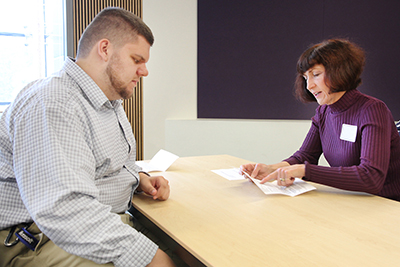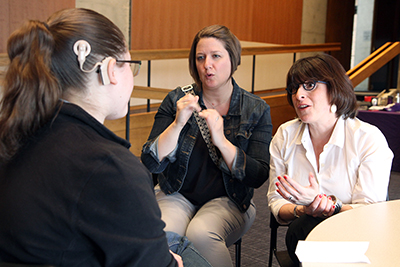
Below are excerpts from recent conversations in our online mentoring community related to disability disclosure and accommodations in the workplace. This gives you the flavor of the many rich conversations the AccessComputing community has online. Forum posts are edited for clarity and brevity.
I was wondering about the helpfulness of disclosing disability, specifically anxiety, on job applications? What are your thoughts?
AccessComputing team member: With a "unseen" disability such as anxiety, I suggest that you don’t disclose it on your resume or on a job application, unless you know the company is very open to people with disabilities.
AccessComputing mentor: The only time I disclose my visual impairment before an interview is if I need an accommodation.
AccessComputing team member: My disability is prominently displayed on one of mine, but that is because my area of focus is accessibility. I want to garner the partial validation that I get from having an actual disability.
AccessComputing team member: For companies like Microsoft that have disability hiring initiatives, it might help you to disclose, but my general rule is if being disabled is not an asset for your job, why disclose? It might look strange to have your application stated this way: Did this thing, did that project, went to this conference, went to this school, have this work experience, and suddenly disability! when disability is completely unrelated to the job.
AccessComputing mentor: Unless you are applying through a program aimed at hiring workers with disabilities, I would not disclose until it is necessary. You don’t need accommodations to submit a resume. Some companies have extensive application processes including taking timed math and/or logic tests, and I have disclosed in order to receive accommodations to finish my application.

AccessComputing mentor: If you do want to put your disability in your application materials, I would put it into the cover letter rather then the resume (even if this requires writing a cover letter) and I would put it in the context of why you’re mentioning it.
I’m interested in observations and experiences with disability accommodations in industry and academia. I’m a graduate student, so I have seen (some of) how things work in academia, and I would be especially interested in perspectives of people who have worked in industry (including internships).
AccessComputing team member: It doesn’t really matter if industry is better in general about accommodations. It only matters what the disability culture is like at the specific place you are considering working. If industry is generally better, but the place you are interviewing at isn’t, then it doesn’t matter. If academia is generally worse, but the place you are interviewing is really positive and progressive, then it doesn’t matter what other institutions are like.
AccessComputing team member: Finding out what the actual culture of the organization you intend to interact with is the most important thing.
AccessComputing mentor: I advise against generalizing, regardless of industry or academia. Each institution could potentially be very different than the next. Earlier someone had commented that you should cast a wide net and explore many possibilities to find something that suits you. I agree with this strategy. However, in all likelihood, you need to limit yourself at some point to going the academic or the industrial route. Go with your passion on this decision, then cast a wide net.
AccessComputing mentor: I think you will find a great deal of variation between industries and companies. The smaller the company, the more accommodating they will be because they don’t have as much bureaucracy to wade through.